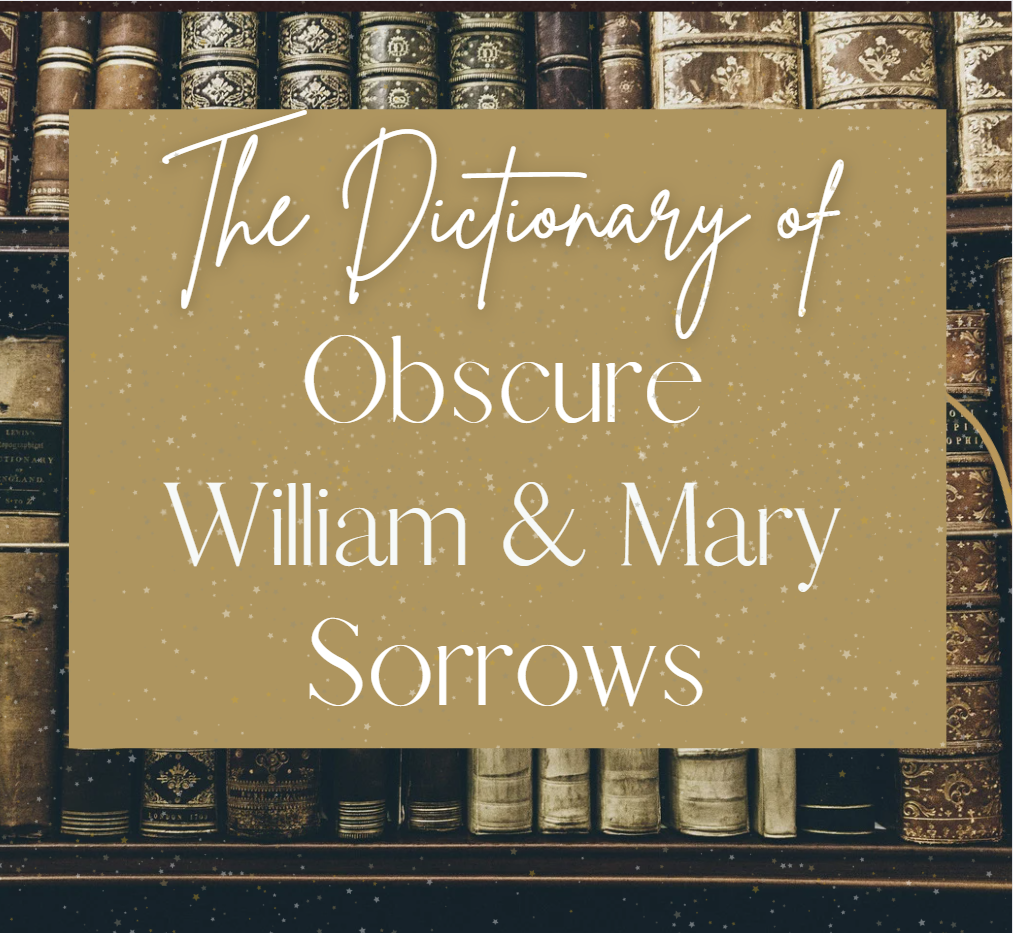The Dictionary of Obscure William & Mary Sorrows
You may have heard of The Dictionary of Obscure Sorrows, a dictionary of words invented by John Koenig to describe feelings that everyone has surely felt at some point in their lives but that we don’t have “official” words for. Koenig’s dictionary is lovely, poetic, and thought-provoking, but his terms are so broadly applicable to a general audience that they miss the 18-22 year old college demographic, and consequently, the daily drama college students go through. I realized that someone needed to come up with a list of college-specific sorrows — ones that almost everyone has probably felt at some point, in some way, shape, or form — and make them obscure no longer.
JR HERMAN // FLAT HAT MAGAZINE
imaskining
v. when you have a crush on someone in class and have never seen their face without a mask, so you dreamily imagine the rest of their face — an impossible to articulate, fiercely subconscious combination of people you’ve known, people you’ve seen, and people you’ve dreamed.
English imagining + English mask
FILMO
n. the wish that college felt as epic as it seems in the movies you watched growing up (the parties, the exquisite romance, the glitz, and the glamour), coupled with the realization that maybe college is like that, for other people — that perhaps you’re just doing something wrong, not getting invited by the right people to the right places at the right times.
English film + English FOMO, Fear of Missing Out
erophilic
adj. describes a relationship between “friends” in which the mutual attraction is palpable in the air, characterized by the jolting electricity of accidental, on-purpose touches; hungry gazes that linger; night-time strolls with too-loud laughter; conversations that derail into flirtatious debauchery; and anticlimactic goodbyes in parked cars and dorms — too scared to make the first move to deconstruct the Maginot lines of the friend zone because, after all, it’s easier to just say goodnight.
Ancient Greek eros, attraction + Ancient Greek philia, friendship or affection + -ic ending
destami
n. the serendipitous ways you’ve met the people most important in your college life — a random big/little assignment, a first conversation about something as meaningless as a meme or squeaky chair, joining an organization on a whim — things which at the time you could never have imagined would set in motion everything that has happened since and now almost seem to have been fated from the start.
English destiny + French ami, friend
newemwhenia
n. the awareness that your older alumni friends are now real adults in the real world, working actual jobs, getting promoted, dealing with adult problems, and no longer able to relate to your complaints about homework and college drama, but yet, as far as you may drift apart, in some ways you’ll always be inextricably tied — you “knew them when” — all their college tea, bad decisions, and secrets that none of their new “adult” friends know.
Portmanteau of “knew them when” + -ia ending
lustgeize
n. intense eye contact which ensues after running into someone around campus who you matched with on Tinder — intimate, yet awkward, their glittering eyes both invasive and vulnerable, simultaneously remembering, desiring, and regretting things (un)said/(un)done, the passersby oblivious to the ghost of longing.
English lust + German geist, ghost + English gaze
ragnateala
n. the tangled, chaotic, incestuous webs we weave and the accompanying tea that’s bound to spill — discovering your new friend or latest crush is an old friend of a friend who knows things they’d rather you not know, an entertaining, thrilling, and sometimes terrifying prospect since you know it’s a two-way street, so you’d better watch where you walk.
Italian ragnatela, spider web + English slang tea, gossip
melgret
n. when you study instead of going out and have a productive evening, or go out instead of studying and have a blast, and if you could do it over, you probably would do it again — yet, you still question the decision, considering the what-ifs and could-have-beens if you had opted for the other, the canvas of contentment streaked with semitranslucent regret.
French malgré, despite + French mélange, mixture + French regret
romcomdomed
adj. the feeling that you’re doomed to live out a romantic comedy, one heavier on the com than the rom, so much so that if you saw aspects of your life in a movie, you’d complain that the cringe is almost unrealistic — “that just doesn’t happen irl” — the universe or director must have a sense of humor.
English romcom + Middle English dom, legal sentence or doom
grantesse
n. the realization that after you graduate, you’ll probably only see most of your friends again during Homecoming Weekend, if that — no matter how much you tell yourself that it won’t be the case, you know deep down that you’ll have to follow their lives through curated Instagram accounts and occasional texts as you march out in the abyss of the real world, forging new relationships which you fear won’t match the old.
French grandir, to grow up + French tristesse, sadness
wutherless
adj. when you don’t know what to do with your life after finals end, suddenly missing the purpose that classes gave you — relieved, yet at the same time, disoriented by the sudden freedom and lack of responsibilities, adrift in the calm when you’re used to the storm’s heavy winds.
Northern English wuthering, strong-blowing (winds) + English -less, without

